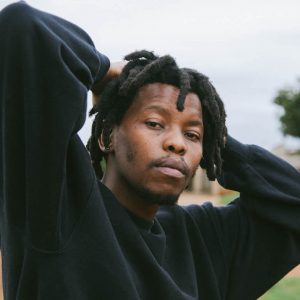Album Review | Mathambo’s ‘Tales from the Lost Cities’
Spoek Mathambo’s latest album offers an audio-documentary on the present state of South Africa. It is a social commentary in the form of music, Spoek’s voice and skits from reality.
Author:
22 May 2020

Tales from the Lost Cities is Spoek Mathambo’s first rap album. While hip-hop has always played a huge role in Spoek’s music, he has always preferred to dabble. The producer, filmmaker and visual artist made a name for himself in the country’s alternative scene and abroad in the early 2010s for his experiments with different genres. He has dabbled in electronic dance music (EDM), kwaito, house and more. The result is a catalogue of solid albums. Spoek is prolific. On top of being a member of groups such as Fantasma and Batuk, he has done work in the visual space as well. He co-created the 2015 documentary Future Sound of Mzansi, which archived some of the country’s forward-thinking and key electronic music artists and producers.
Related article:
In his latest album titled Tales from the Lost Cities, the 2020 Standard Bank Young Artist for Music winner captures the current mindset of a majority of South Africa’s black youth. “The title came from the idea that in a post-extinction-level-event world, a hard drive is found with the Mzansi files. So, bengikhiph’ amafile (I was extracting files) for posterity,” says Spoek Mathambo.
The album’s themes
In the album opener Umhlaba Wethu, he touches on the issue of land reform, rapping:
We live in delusion
No rainbow nation
A mirage, an illusion
Slipping away
And everybody’s losing
The song goes on to call for better salaries for farm workers in South Africa.
He explores the polarity of wealth and poverty in Kroonocyde (Gini Index), a song that paints a chaotic picture of an unequal society that breeds criminals on both sides. Those who are rich can “buy” justice while the poor rob to feed themselves.
The song Anatomy of a Campus Riot is a thoughtful vignette of recent student protests in South Africa’s universities. It zooms in on internal issues that plagued these events: the preferential treatment received by white students during protests, “comrade-to-comrade violence” and patriarchy within the movement.
When The Party Parties Too Hard is a scathing critique of the ruling party. It opens with an old clip from a Radio Freedom report about The Freedom Charter. Spoek’s rhymes in the song are a juxtaposition of the “a better life for all” tagline of the 1955 document as he raps about unpleasant realities faced by a majority of South Africans today.
“Kubolile (it’s rotten),” says the artist, referring to the ruling party’s current state. “The ANC is just a symptom of lokubola (the rot). I think that the rot is very deep in South Africa, and it’s not the ANC alone that’s a problem.” Asked if he sees any hope for the disgraced party, he responds, “That all depends if there’s a genuine will for reform, restitution and accountability. There hasn’t been any evidence for that. Either way, the problems of unrelenting greed and merciless violence might follow us after an ANC government is gone if we don’t address those problems.”
Hip-Hop’s critical potential
Tales of the Lost Cities may not have all the answers, but it begins these conversations. Albums that confront the uncomfortable realities faced by everyday South Africans are rare in the country’s contemporary hip-hop scene. YoungstaCPT’s 3T and Stogie T’s The Empire of Sheep are two of the few released by high profile rappers in the near past.
Related article:
“Hip-hop has phenomenal potential for empowerment, cultural upliftment, instructive or educative information dissemination,” says Mathambo. “For a lot of us, it was a call to dig deeper. The album came from observing the state we’re in. It comes from walking around; talking to family, friends, strangers in the queue at Home Affairs; listening; eavesdropping; watching the news, the Zondo Commission, the Land Expropriation Commission and the Public Prosecutor’s Investigations, etc.”
Spoek has been sitting on a lot of music. He has many songs yet to be released. What is in Tales from the Lost Cities is but a fraction of his artistic output, and he does not plan on releasing anything new in the near future. “But it doesn’t really make sense to say anything else in this mad moment,” he says. “This feels like an especially crazy moment, but maybe this place has been crazy for a long time, and we have all had the front row seat that has desensitised us.”
The Covid-19 pandemic has highlighted a number of problems South Africa (and other countries) have been sweeping under the rugs for decades: poverty, white privilege, and the discrepancies that exist among the country’s different races and classes. It’s the same issues tackled in Tales from the Lost Cities. “I just took it upon myself to report a sliver of what’s going on,” he says, “of what’s in communities, what’s in conversations, and what’s on the news every day.”
The artist and producer is concerned by the fact that such topics are nowhere to be found on most rappers’ albums. “The lack of releases from older artists is really making the musical output immature in content and outlook,” he says. “I want to balance that; give more voices and sounds. The music is frighteningly cookie-cutter right now—one hook fits all, one sample pack fits all, one flow fits all.”
Related article:
This is not the case in Tales from the Lost Cities. Spoek Mathambo deploys different styles of rapping in the project’s songs, adapting his flow to a varied set of beats that range from colourful and aggressive electronic production to soothing reggae, bass-heavy trap, and a selection of jazz elements and other genres. “I wanted the songs to all have very specific themes, so I was going for moods, vibes and personal memories that would correspond with themes,” he says. “The sound of urban decay. The sound of upliftment. The sound of revolution.”
It explains the riotous nature of the beat for Umhlaba Wethu (a song that pokes holes at the concept of the Rainbow Nation and demands reparations), the chaotic electric guitars on eGoli (The Jackers Theme) (a song about crime in Johannesburg), or the trap influence on Jimmy Comes to Jozi (a song about the gritty side of Johannesburg).
An audio documentary
Tales from the Lost Cities plays out like an audio documentary. While Spoek Mathambo narrates stories and provides commentary in his rhymes, skits from actual events bolster his words. The interlude The Greedy Always Want More, for instance, contains clips from some of the National Assembly’s heated moments. The infamous clip of the leader of the United Democratic Movement (UDM) Bantu Holomisa fumbling a variation of the famous adage “if you give a hungry man a fish, you feed him for a day, but if you teach him how to fish, you feed him for a lifetime” live on television recurs in the song acting like some form of chorus.
In Keeping Score, an interlude leading towards When The Party Parties Too Hard, the likes of Jacob Zuma, Phumzile Van Damme and President Cyril Ramaphosa among others admit to the cancer of corruption in the ruling party in different instances.
The album is not without its faults, however. The infamous blesser Serge Cabonge’s insert from an episode of eNCA’s Checkpoint sets the tone for the cautionary tale Spoek Mathambo tells in the song Slay Queen. In the song, the rapper traces the story of a young woman from her teenage years to a tragic end after chasing glamour all the way to Dubai. Slay Queen is narrow in its scope and critique. Writer Rofhiwa Maneta, in a City Press article, writes that the song is “a nasty item masquerading as a cautionary tale against the pitfalls of transactional sex”. He went on to say, “What the song fails to consider is that not everyone who enters into these transactional relationships is poor and desperate. In a society where men routinely capitalise on women’s beauty, what’s the problem with women upending that narrative and cashing in on their looks?”
Related article:
Notwithstanding this track, the album is ultimately well realised. As an album, Tales from the Lost Cities roots itself in multiple dynamics of sonic storytelling. “I’ve always enjoyed storytelling in rap,” Spoek Mathambo explains. “Rappers like Aceyalone, Slick Rick or Ice Cube who could weave epic narratives, linear or otherwise. Or conceptual artists like Kendrick Lamar, Del The Funky Homosapien, Buck65. On this album, again, 10-year-old me wanted to do that. I have never been able to do that well. I embraced the challenge and pushed myself.”
Tales from the Lost Cities is one of the very few South African hip-hop albums that tells the stories of present-day South African realities. Not only does it succeed in broaching topical issues, it has a high replay value owing to its varied production, coupled with Mathambo’s lyrical proficiency.



